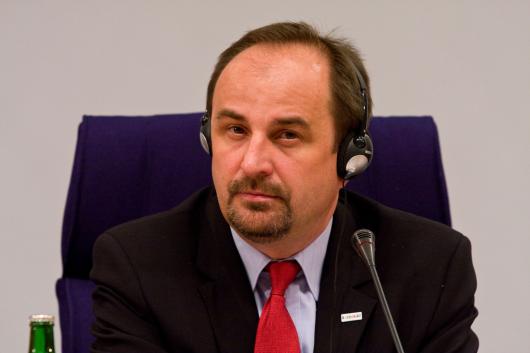
Minister Kohout: Regional co-operation can drive defence policy
15.11.2013 / 17:58 | Aktualizováno: 21.11.2013 / 18:06
The EU's common security and defence policy could be enhanced by learning the lessons of regional initiatives writes the Czech Minister of Foreign Affairs.
The European Union has come a long way in developing its security and defence arm. Eyes are now firmly set on December's European Council, which could open the next chapter in the evolution of the common security and defence policy (CSDP) towards establishing the EU as a widely credible, hands-on actor in crisis management and conflict prevention.
It is, however, important not to get lost in grand strategic musings and, instead, to focus on promoting practical steps of co-operation. In this respect, regional co-operation - more close-knit undertakings by clusters of EU member states - could form the building blocks of the EU's common security and defence architecture.
We do not lack ambition, but need to show results in equal measure. The summit will act as a reminder of progress made so far and, more importantly, of the long, tricky road ahead.
Whatever its detractors say, the CSDP has made impressive strides. Over a relatively short period, Europe has demonstrated that it means business when it comes to security and defence matters. The EU has proved its credibility on the ground in Africa and the Balkans, and has been deploying its naval assets effectively in anti-piracy operations off the coast of Somalia. But what has so far hampered these efforts is a lack of more permanent structures for co-operation.
If recent events are any indication, Europe will in future have to deal with complex contingencies on its doorstep requiring not only the use of force, but also robust civilian capabilities. This is the heart of the comprehensive approach that the EU wants to have at its disposal - combining military, diplomatic and humanitarian tools.
However, in order to get there, cash-strapped European countries will not only have to work together to field joint capabilities, but will also have to commit themselves to using them as the need arises. In other words, we already know how to use our national assets for the same goal; now we need to learn how to develop and maintain these assets together. This will require closer co-ordination with European institutions.
Europe seems determined for now, but in order to maintain this positive momentum we need more successful examples of practical co-operation. These need not be giant leaps forward, but rather consistent, small steps to make the CSDP a more credible tool. Increased co-operation at the regional level is one of these necessary small steps.
In fact, regional co-operation has already proved more successful as geographic-proximity, similar strategic cultures and similar understanding of their roles in world affairs allow neighbouring countries to co-operate more effectively. Take central Europe, for instance. Working side by side within the Visegrád Group, the Czech Republic, Hungary, Poland and Slovakia will launch a joint EU battle-group - a rapid-reaction force comprising units from all four countries ready to be deployed at short notice to conflict situations. The group should be fully operational by 2016. Before then, in 2015, a standardisation exercise will take place. Such joint exercises should become a regular occurence, contributing to greater interoperability and interconnectivity among these four central European countries.
Joint procurement programmes are already in the pipeline, and, last but not least, we have begun to explore the possibilities of joint training of civilian experts.
In the wake of the European Council, the EU will need to follow up with specific commitments. The main short-term question will be how much member states will be to willing to pool and share their capabilities to equip the EU better to manage crisis situations.
Successful regional initiatives, like those among the Nordic or central European countries, may convince others to follow suit, thereby boosting the EU's CSDP credibility. Not to do so would risk the EU sliding back to square one in the debate over a new sense of purpose and direction for defence co-operation.
Jan Kohout, Minister of Foreign Affairs of the Czech Republic.




